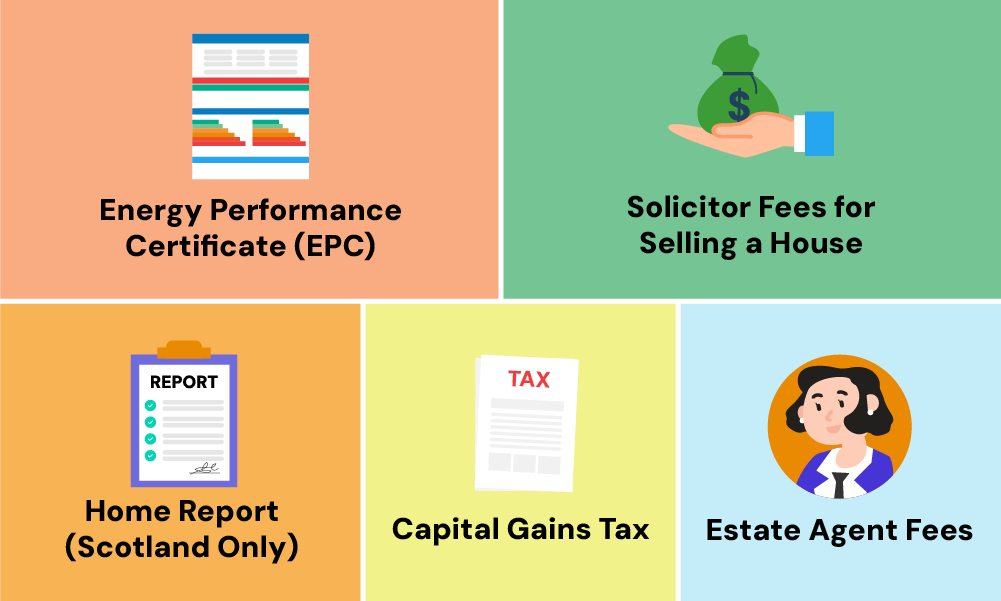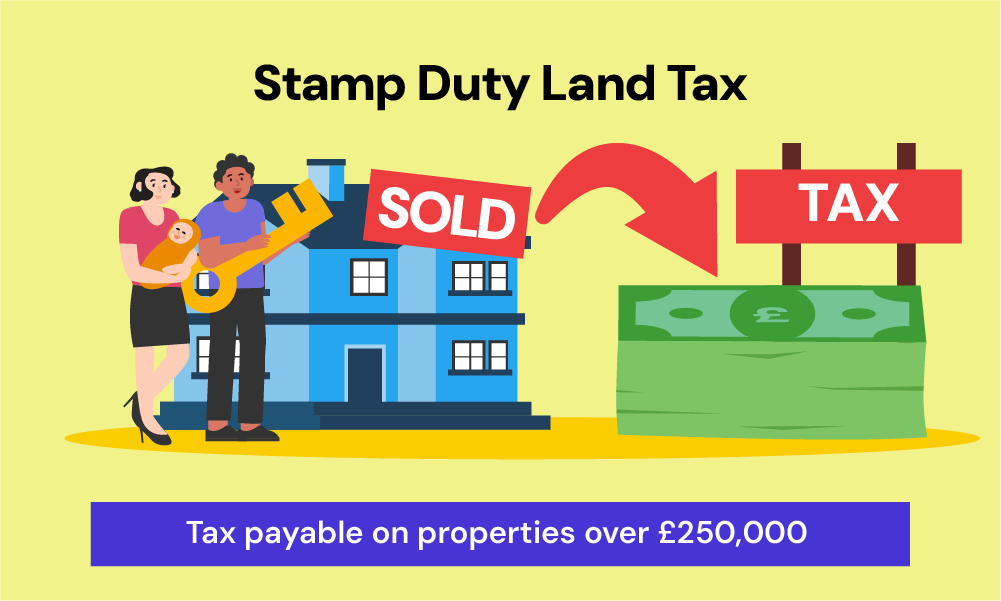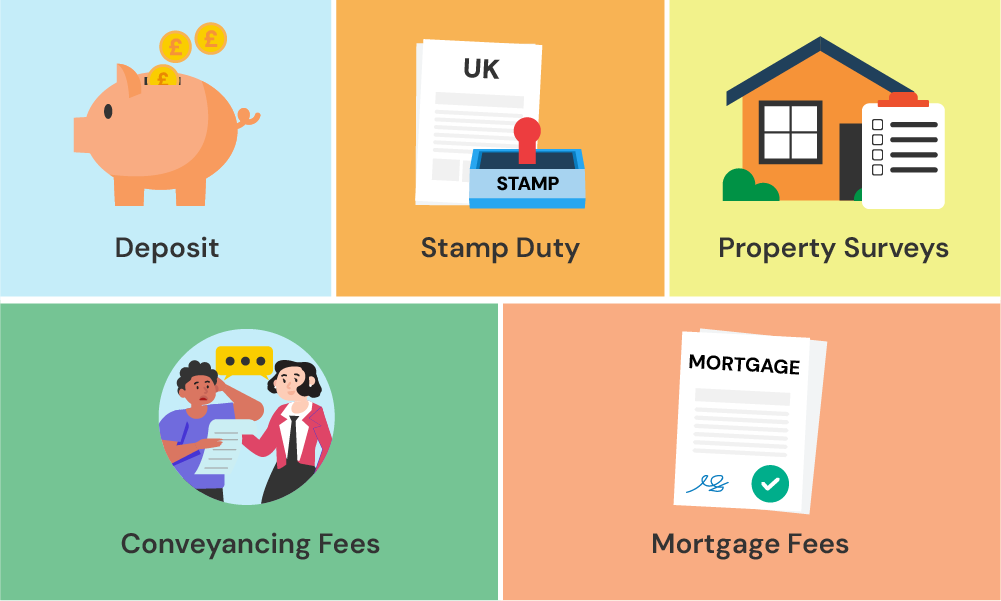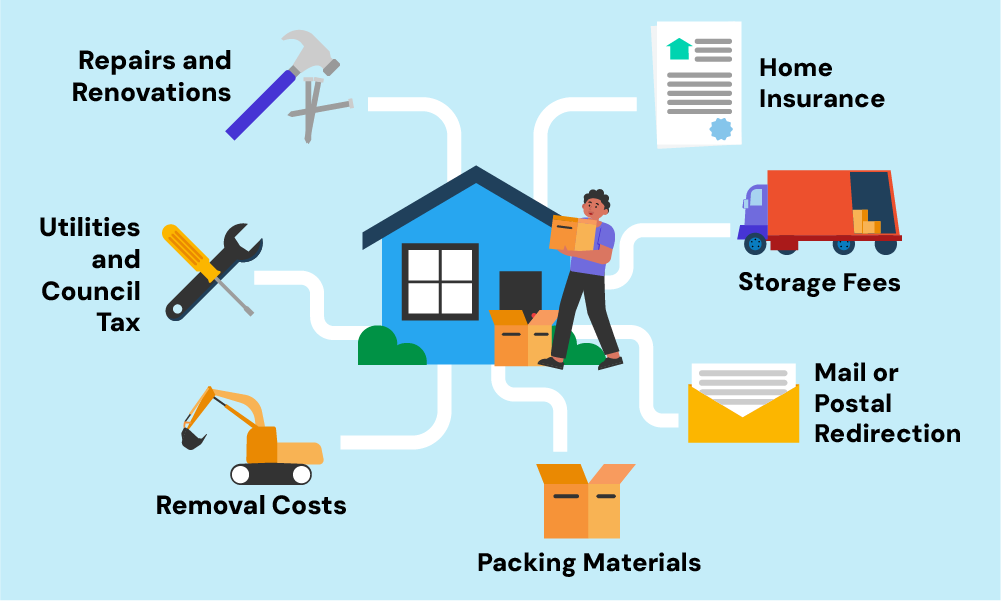How Much Does It Cost to Move Home in the UK?

Are you considering a move this year? It’s an exciting milestone, but careful planning and budgeting are key.
From hiring movers to paying legal fees, the costs can quickly add up.
In this complete guide, we’ll explore the costs you can expect when moving homes in the UK in 2024, helping you prepare accordingly.
What Is The Average Cost Of Moving A House In The UK?
The average cost of moving house in the UK is approximately £12,187. But this figure can vary considerably depending on several factors.
These include the location you’re moving to, the property size, the distance you’re travelling, and any extra services you need.
When moving home, you’ll face 3 primary expenses: selling your current home, buying a new home, and the actual moving process.
Here’s a quick overview of these costs:
Cost of Selling Your Current Home
| Cost Type | Typical Cost |
|---|---|
| Estate Agent Fees | £2,850 – £8,550 |
| Energy Performance Certificate (EPC) | £60 – £120 |
| Home Report (Scotland Only) | £585 – £820 |
| Capital Gains Tax | 18% – 24% on profits over £12,300 |
| Solicitor Fees for Selling | £1,050 – £2,520 |
| Anti-Money Laundering Checks | £5 |
| Bank Transfer Fee | £40 |
| Mortgage Property Supplement Fee | £220 |
| Title Register Copy | £6 |
Cost of Buying a New Home
| Cost Type | Typical Cost |
|---|---|
| Deposit | £14,100 to £56,400 |
| Stamp Duty | £0 to £36,250 |
| Property Surveys | £300 – £1,500 |
| Conveyancing Fees | £1,090 – £2,710 |
| Property Searches | £290 |
| Land Registry Fees | £40 – £910 |
| Anti-Money Laundering Checks | £5 |
| Bank Transfer Fee | £40 |
| Mortgage Property Supplement Fee | £220 |
| Mortgage Fees | £0 – £2,000 |
| Valuation Fees | £100 – £300 |
Additional Moving Costs
| Cost Type | Typical Cost |
|---|---|
| Home Insurance | £95 – £120 annually |
| Utility Setup | £100 initial setup + monthly bills |
| Removal Costs | £450 – £1,400 |
| Mail Redirection | £36 (3 months), £53 (6 months), £76 (12 months) |
| Storage Fees | £25 – £100 per week |
| Packing Materials | Up to £100 |
Let’s break down these costs to provide a clearer picture.

How Much Does It Cost to Sell Your Current Home?
First, let’s discuss the cost of selling your home. Here’s a detailed breakdown of what to expect when selling your home in the UK.
Estate Agent Fees
Estate agent fees can be one of the largest expenses when selling a home.
High-street estate agents typically charge between 1% and 3% of the final property price. For a £285,000 home, expect to pay £2,850 to £8,550.
Online estate agents offer lower fixed fees starting around £300 but may require you to conduct viewings yourself.
Comparing estate agents and their fees can SAVE you money. Some online tools can help you find local estate agents ranked by success rate, speed of sale, and the sale price achieved.
Energy Performance Certificate (EPC)
An Energy Performance Certificate (EPC) is mandatory and assesses your property’s energy efficiency. The cost ranges from £60 to £120, depending on your local assessor’s prices.
You can arrange an EPC through your estate agent, but it might be more cost-effective to shop around for quotes from qualified local energy assessors.
Home Report (Scotland Only)
In Scotland, sellers are required to produce a Home Report, which costs between £585 and £820.
This report includes an energy performance certificate, a property questionnaire, and a single survey that reveals any issues with the property.
The survey categorises issues on a 1-3 scale, with category three indicating urgent repairs.
Capital Gains Tax
If you’re selling a property that is not your main home, such as a rental property or holiday home, you might be liable for Capital Gains Tax.
This tax applies to profits exceeding £12,300 (the tax-free allowance). Here’s an overview of the current CGT rates for selling property:
| Tax Bracket | CGT Rate on Profit |
|---|---|
| Basic rate (Your annual total income is below £50,270) | 18% |
| Higher/additional rate taxpayer | 24% |
Solicitor Fees for Selling a House
Legal fees for selling a home range from £1,050 to £2,520, depending on whether the property is freehold or leasehold and its value. Additional disbursements may include:
- Anti-money laundering checks: £5
- Bank transfer fee: £40
- Mortgage property supplement fee: £220
- Title register copy: £6
It’s advisable to get quotes from multiple conveyancers to find the best service at the most reasonable cost.

What are the Costs Involved in Buying a New Home?
Buying a new home involves various costs beyond the property price. Here’s a detailed breakdown of the typical expenses you should prepare for when buying a new home in the UK in 2024.
Deposit
Most buyers need a deposit of at least 5% to 20% of the purchase price. For a £282,000 average UK home, this amounts to £14,100 to £56,400.
Having a larger deposit can improve your chances of securing a better mortgage rate.
You will need to pay your deposit to your solicitor on the day you exchange contracts, which commits you to the purchase.
Stamp Duty
Stamp Duty Land Tax (SDLT) is a significant cost for homebuyers in England and Northern Ireland. For properties priced above £125,000, the rates are as follows:
| Property Purchase Price | Rate | Payable Amount |
|---|---|---|
| Up to £125,000 | 0% | £0 |
| £125,001 to £250,000 | 2% | £0 – £2,500 |
| £250,001 to £925,000 | 5% | £2,500 – £36,250 |
| £925,001 to £1.5 million | 10% | £36,250 – £93,750 |
| Over £1.5 million | 12% | £93,750 – £153,750 |
First-time buyers purchasing a £425,000 property would pay £6,250. Here’s a look at their SDLT rates:
| Property Purchase Price | Rate | Payable Amount |
|---|---|---|
| Up to £300,000 | 0% | £0 |
| £300,001 to £625,000 | 5% on portions above £425,000 | £0 – £10,000 |
| Over £500,000 | No relief – standard rates apply | Varies (see standard rates) |
As of April 2025, the surcharge for additional property purchases (like second homes or rentals) has increased to 5%, added on top of the standard SDLT rates. Here’s an overview:
| Property Purchase Price | Rate | Payable Amount |
|---|---|---|
| Up to £125,000 | 5% | £3,750 |
| £125,001 to £250,000 | 7% | £3,750 – £10,000 |
| £250,001 to £925,000 | 10% | £10,000 – £64,000 |
| £925,001 to £1.5 million | 15% | £64,000 – £138,750 |
| Over £1.5 million | 17% | £138,750 – £213,750 |
In Wales, the Land Transaction Tax replaces SDLT, and in Scotland, the Land and Buildings Transaction Tax applies.
For an accurate estimate, use the Stamp Duty Land Tax Calculator here.

Property Surveys
Property surveys are crucial to identify any structural issues with your prospective home. The cost of surveys varies depending on the type and depth required.
Here are the most common types of surveys and their associated costs:
| Type of Survey | Typical Cost | Suitable For |
|---|---|---|
| Condition Report (Level 1) | £300 – £900 | Standard properties, new homes |
| Homebuyer Report (Level 2) | £400 – £1,000 | Standard properties in good condition |
| Building Survey (Level 3) | £630 – £1,500 | Older, larger, or unique properties |
| RICS Valuation Report | £331 | Confirming property value |
| Scottish Home Report | £585 – £820 | Selling property in Scotland |
Surveys are essential when buying with a mortgage, as they inform you about the property’s condition, identify potential problems, and provide peace of mind by highlighting any immediate repairs needed.
A typical survey for a house priced between £250,000 and £350,000 would cost around £500 to £900.
The right survey depends on the property’s age, type, and condition.
For accurate and instant house survey quotes, connect with local chartered surveyors. This allows you to compare quotes and choose the right survey, ensuring you get the best value for your investment.
Conveyancing Fees
Conveyancing fees cover the legal work involved in buying a property. These fees typically range from £1,090 to £2,710, depending on whether the property is freehold or leasehold and its value.
On top of the legal fees, you’ll also need to pay for additional expenses called disbursements. These typically include:
- Property searches: £290
- Land Registry fees: £40 – £910
- Anti-money laundering checks: £5
- Bank transfer fee: £40
- Mortgage property supplement fee: £220
- SDLT return fee: Varies
Buying a property to rent it out (buy-to-let) usually involves more paperwork and therefore higher solicitor fees.
To find the best conveyancing deal and avoid surprises, it’s wise to get quotes from several conveyancers. Make sure each quote includes all potential disbursements.
If not, ask the conveyancer whether these additional costs are likely to be required. This will help you compare prices accurately and avoid unexpected expenses later.
For a more detailed and personalised quote, you can use a conveyancing fee calculator online.
Mortgage Fees
Taking out a mortgage can come with several fees that bump up the overall cost of moving house.
To save money, it’s crucial to compare mortgage deals, including any fees they charge.
Here’s a breakdown of the costs you might encounter:
- Arrangement Fees (£0 – £2,000). Lenders charge this fee to set up your mortgage. Some lenders offer fee-free mortgages or include it in the loan amount.
- Valuation Fees (£100 – £300). Lenders need to confirm the property value before lending you money. They charge this fee to cover that valuation.
- Mortgage Broker Fees (No Fee – 1% of Mortgage Amount). Some brokers work for free, while others charge a percentage of your mortgage. We recommend using a free broker to find the best deal.
- Mortgage Protection Insurance (Varies). Policies like Mortgage Payment Protection Insurance (MPPI) can cover your mortgage payments if you can’t work due to illness, injury, or job loss.
- Early Repayment Charges (1%-3% of Remaining Mortgage Balance). Leaving your mortgage early can be expensive. Early repayment charges can cost thousands of pounds.
Moving house might allow you to transfer your current mortgage, but taking out a new one typically involves extra fees.
Some lenders even include valuation fees or offer fee-free mortgages entirely. To save money, it’s wise to compare deals from different lenders.
Consulting a free mortgage broker can simplify your search for the best mortgage deal. Qualified brokers can explain different fees and potential savings, making sure you’re fully informed about all the costs involved.

What are the Additional Costs to Consider?
Apart from selling your old home and buying a new one, here are additional costs you must consider when moving:
Home Insurance
You’ll need buildings and contents insurance when buying a new home. Buildings insurance will need to be bought before exchanging contracts and typically costs between £95 and £120 annually.
Contents insurance covers your belongings inside the home and is usually purchased separately.
Repairs and Renovations
Budget for any immediate repairs or renovations your new home may require. The cost can vary widely based on the property’s condition.
It’s wise to have a contingency fund for unexpected repairs to ensure your home is safe and comfortable.
Utilities and Council Tax
Setting up utilities and paying council tax is essential. Initial setup costs might be around £100, plus your regular monthly bills.
Utility bills include gas, electricity, water, and internet, while council tax varies depending on your local council and the property band.
Removal Costs
Moving day can be stressful, but hiring a removal company can make the process smoother.
The cost of removals will vary depending on the size of your home, the volume of items, and the distance travelled.
For example, moving a one or two-bedroom house typically costs £450-£550, while a five-bedroom house can cost around £1,400.
Long-distance moves and additional services like packing can increase these costs. It’s advisable to get quotes from multiple removal companies to find the best deal.
For a more accurate estimate, use a removal costs calculator that factors in the size of your property and the moving distance.
Mail or Postal Redirection
Royal Mail’s mail redirection service ensures that any mail sent to your old address is diverted to your new address.
This service costs £36 for up to three months, £53 for six months, and £76 for a year.
If you are moving with someone who has a different surname, they will also need to pay for redirection.
Storage Fees
If there’s a gap between moving out of your old home and into your new one, you may need to pay for storage.
Storage fees can range from £25 to £100 a week, depending on the size and location of the storage facility.
Packing Materials
Purchasing packing materials like boxes, tape, and bubble wrap can add to your moving costs. These materials can cost up to £100, depending on the quantity and quality needed.

How Can You Save Money on Moving Costs?
While moving can be expensive, there are several ways to minimise the costs:
- Plan ahead and get multiple quotes for services
- Declutter and sell unwanted items
- Pack non-essential items yourself
- Choose a mid-month or mid-week move (when rates are lower)
- Enlist the help of friends and family for packing and loading
- Negotiate with service providers for discounts or package deals
By being proactive and exploring cost-saving strategies, you can make your move more affordable.
Image to show all the additional costs involved when moving home in the UK.
The Bottom Line
Moving home in the UK involves various costs, but with careful planning and budgeting, you can manage these expenses effectively.
As you prepare for your move, consider all potential costs and look for ways to save. Consulting a mortgage broker is a smart way to streamline the process and stay informed about all financial aspects of moving
Looking for a broker? Get in touch. We’ll connect you with a qualified mortgage broker to help make your move smoother.
Get Matched With Your Dream Mortgage Advisor...

Frequently asked questions
Why is moving house in the UK so expensive?
Moving house in the UK is expensive due to various costs that add up quickly.
These costs include estate agent fees, which typically range from 1% to 3% of the property price, legal fees for solicitors, and stamp duty land tax (SDLT).
Additional expenses such as property surveys, removal services, and home insurance further increase the overall cost.
Moreover, if you’re selling a property that isn’t your main home, you might also face capital gains tax. All these combined make moving house a significant financial commitment.
When do I pay solicitors fees when selling a house?
You usually pay solicitors fees at the end of the property transaction when selling a house.
The solicitor will send you a completion statement outlining all the costs involved, including their fees and any disbursements.
You settle this statement, often on the day of completion, before the sale proceeds are transferred to you.
Some solicitors may require an initial deposit or payment on account at the start of the process.
How much does it cost to move a 1, 2, 3, or 4 bedroom house in the UK?
The cost of moving house in the UK varies based on the size of the property and the distance of the move. On average:
- Moving a 1-bedroom house costs between £450 and £800.
- Moving a 2-bedroom house costs between £600 and £1,000.
- Moving a 3-bedroom house costs between £800 and £1,500.
- Moving a 4-bedroom house costs between £1,100 and £2,000.
These costs include hiring a removal company, packing services, and transportation. Long-distance moves and additional services can increase these prices.
How often do British people move house?
Brits move house every 23 years on average, but this can change quite a bit. Younger folks and families with growing needs or job moves tend to relocate more frequently.
On the other hand, older individuals might stay put in their homes for much longer stretches.




